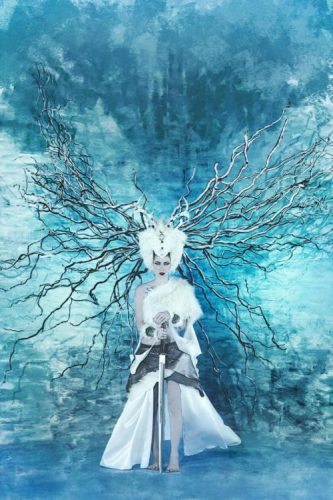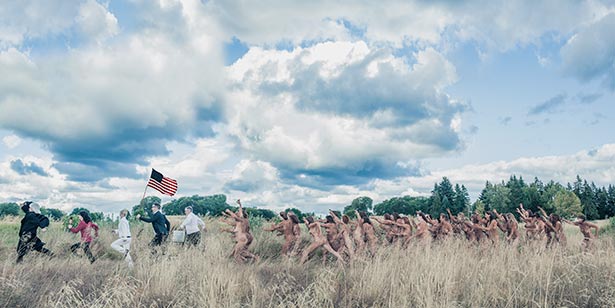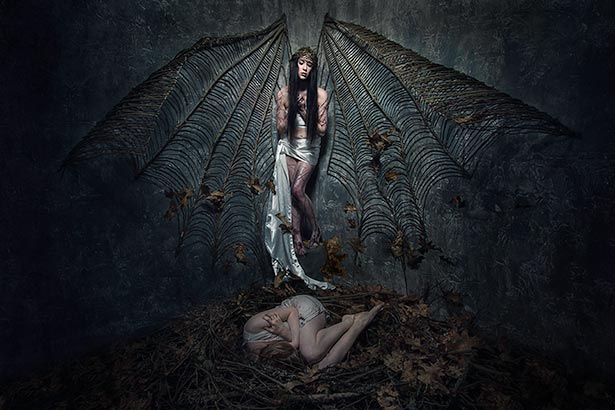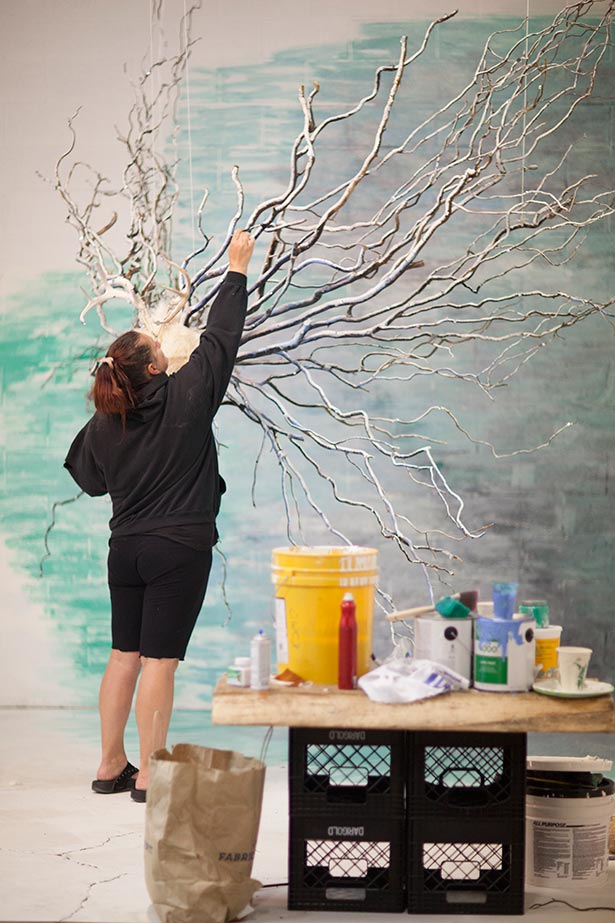
The Stag Queen emerges from the icy blue abyss. Sword in hand, she hovers over a huddled little girl. Bruised and beaten, scared and forgotten, no one will ever be able to lay a finger on her again. The queen has returned for answers, for retribution, and will forever guard this child in the recesses of one woman’s mind.
Every time artist Tracy Sydor recalls her childhood, this guardian also returns, protecting her younger self from the residual pain of childhood abuse.
“I created her, she is part of me,” Sydor says of the Stag Queen. “No one is going to hurt me again because this person that I created is here and she is going to kick your ass, and she’s going to kick everyone else’s ass that are hurting women and children.”
 |
|
Tracy Sydor wanted to channel the ‘rawness of femininity’ for the ‘100 Women’ shoot. Photo by Rob and Tracy Sydor
|
“Stag Queen,” as seen on this issue’s cover (portrayed by local model Ashley Meierotto), is part of the “Jaded Jane” photo project the photographer started in 2013. A survivor of abuse herself, Sydor created Jaded Jane as a platform for survivors of physical, mental and sexual abuse to share and process their experiences.
Survivors can submit stories to Sydor via the website, and together they will process the experience through a photo shoot. Jaded Jane stands alongside Digital Latte Photography, Sydor’s company that specializes in empowering portraiture of women. She has recently started turning her photo shoots and model calls into benefits for Womenspace, a nonprofit organization providing intimate partner violence support services.
Voted Best Visual Artist in EW’s 2013 Best of Eugene poll, Sydor has only been pursuing photography since 2006 but has already carved out a following, albeit ruffling some feathers along the way with her sometimes graphic imagery. As her photos become stronger and gain resonance, Sydor continues to ask the perennial question: What am I doing this for?
Sydor tells me the story of “Stag Queen” while sitting on the floor of her studio on Bertelsen Road. As she speaks, her kind brown eyes are like the placid surface of a lake; there’s beauty and mischief, there’s a quiet ferocity and sadness and, below the surface, there’s a world of unknown and unseeable activity.
“I grew up extremely abused by my parents and not liked at all,” Sydors says. Raised as one of 13 step and half siblings by her mother and stepfather, the family crisscrossed the West Coast and the South as migrant workers. “We were poor and broke and farmed the land,” she says. School was not a priority and her brothers and stepfather abused Sydor while her mother stood by. She ran away from her family home in Oroville, Washington, at 15.
“The abuse was too much. The sexual assaults were too much. They just broke my mind,” Sydor says. “I just knew that as soon as I was able to leave, I should leave.” After leaving, Sydor says, “I hustled and bustled and begged, stole and robbed — survived.”
In her late teens, Sydor found herself in an abusive relationship with the man who fathered her first two children, daughters Lois and Mistie; with few resources, Sydor extricated herself from the abuse and signed over custody to the man’s mother.
At 19, she was bussing tables at a Granny’s Buffet in Kennewick, Washington, where she met her current husband and professional partner, Rob Sydor, then a dishwasher. They were married after her 21st birthday and now have a daughter, 14, and a son, 8. Rob Sydor picked up photography and invited Tracy Sydor to join.
 |
|
‘Missing Messiah,’ a jaded jane image. Photo by Rob and Tracy Sydor.
|
Tracy Sydor started her professional photography career doing what most photographers do, taking senior photos, portrait commissions — but without a larger purpose, it felt empty.
“When I first started learning about photography, it kind of started like, maybe I could do something with my past and try to process things in a different sort of way,” she says. “Through my travels, I run into so many victims that have never really processed anything themselves. I’m not a doctor; I’m not a psychotherapist or whatever the label is — I’m not any of that. I’m just a girl with a camera.”
Tragedy solidified Sydor’s creative purpose. Having been separated from Sydor for most of her youth, Lois was finally going to visit Eugene to learn about photography from her mother. On Sept. 6, 2012, shortly before her trip to Oregon, Lois was hiking with friends near Spokane and fell from a cliff to her death.
“She was so young and that was her passion, helping people and helping females and empowering females. I was so proud of her for that. I wanted to incorporate that into my work,” Sydor says, tears forming as she sits among photo props. “It made me really think about, how can I be a leader in my community and be a voice for women in my community and be a successful photographer?”
Sydor now has an expansive portfolio of images for both Jaded Jane and Digital Latte. She has developed a network of local designers, makeup artists, stylists and other artists who collaborate with her on photo shoots. Vanessa Froehling, the designer behind Eugene label Stitches by V, is a frequent partner and created the Stag Queen ensemble.
The Sydors, Froehling, stylist Paris Black, makeup artist Mary Getty and several local models collaborated on a Dracula-meets-Queen of the Damned shoot, which was published this week in Dark Beauty, a national magazine that features talent “from the darker side of the arts community.”
Many of the images for Jaded Jane, however, are much more explicit than Stag Queen, showing blood and the suggestion of violence. Because of this, some have not warmed to her mission. After posting a Jaded Jane image to a local photography group on Facebook, Sydor received some blowback.
“All you’re doing is promoting violence,” she recalls one woman commenting. Another woman joined in and recommended Sydor put down her camera and change her path in life. “I was trying to raise awareness,” she says. “I was blown away … I was like, ‘How could this happen?”
She pauses. “It just fired me up. I wanted to do it more. I wanted to get in people’s faces. It’s not something you hear about. It’s not dinner-table talk. You don’t hear people talk about that shit in the supermarket and I feel like that’s a really big part of who we are. We’re abused and damaged as people — where’s the reprieve from that? Counseling? Drugs? I don’t know, but I know that my camera makes me feel a lot fucking better about this.”
 |
| Tracy Sydor paints curly willow tree branches for ‘Stag Queen’ |
Earlier this month, Sydor’s most recent vision came to fruition: The “100 Women” photo. About a year ago, Sydor grew angry from stories in the news about politicians infringing on women’s rights. “Let’s do something,” Sydor remembers thinking. “Even if it’s just from our own small community, let’s put it out there that we don’t want politicians, people in higher positions, telling us what we should do with our bodies.”
Sydor put a call out for women to join a photo shoot where they would have to participate in full nudity. The result? Dozens of women showed up, slathered themselves with mud and chased after models dressed as a judge, a news anchor, a congresswoman, a banker and a government official. Women and men have already asked if they can participate next time and requested that she make the photo shoot an annual event.
When asked if she ever imagined as a young girl becoming the artist she now is, Sydor thinks for a moment.
“All I imagined as a little kid was getting out of my house. Anything above that was icing on the cake,” she says. “I’m having the time of my life right now. I love what I’m doing.”
Sydor will host The Outsider’s Ball, a “dark art” exhibit with several other local artists with music by Wetsock and the Egotones 7 pm Saturday, Oct. 25, at her studio, 1000 S. Bertelsen Rd., No. 2; entry fee is a donation of winter clothes, coats and blankets for Womenspace. Costumes encouraged. To see more of Sydor’s work, visit jadedjane.com and digitallatte.com.